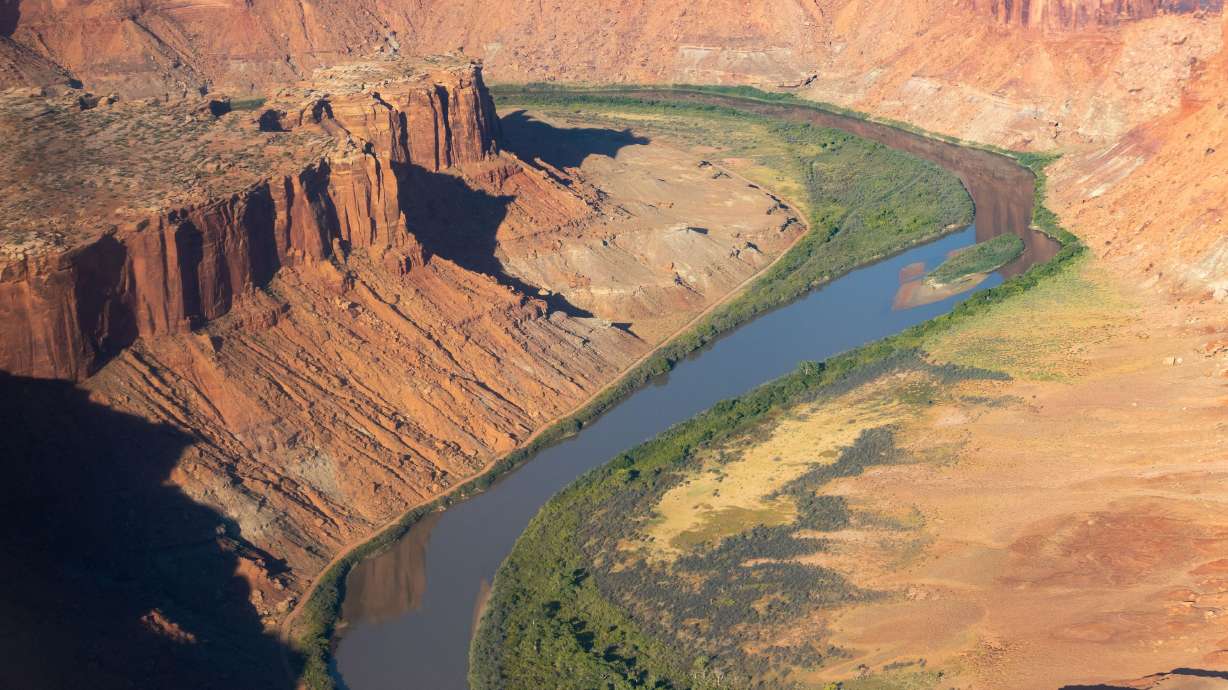Estimated read time: 5-6 minutes
This archived news story is available only for your personal, non-commercial use. Information in the story may be outdated or superseded by additional information. Reading or replaying the story in its archived form does not constitute a republication of the story.
GREEN RIVER, Emery County — Lithium.
It's a soft, silvery metal that is the least dense of any metal on the periodic table and vital for transitioning to electric vehicles because of its use in batteries that also include laptops and cellphones.
There is a vast source of this material in Green River, Emery County, where there is a planned site to mine lithium at a former military base, where surface ground disruption has already happened. The company's website said there is a separate chunk of a project area near Moab.
Bruce Richardson, chairman and CEO of Anson Resources, recently briefed lawmakers on the project's progress, which is still in the permitting process.
During its first phase, the project will require a workforce of 500 employees involved in construction of the plant, which aims to produce 10,000 tons of the material a year at the outset.
"Utah has a very big resource," he said.
In a state already stressed out due to water scarcity, Richardson emphasized to members of the Natural Resources, Agriculture and Environment Interim Committee that 80% of the water the project requires will be recycled.
The Paradox Lithium Project secured leases from an agricultural user via the Wayne County Water Conservancy District. The total lease for water from the Colorado River is 12,500 acre-feet, but the total consumptive use is 2,500 acre-feet, Richardson said. An acre-foot is enough water to cover a football field by a depth of 12 inches.
Additionally, the brine that contains the lithium carbonate at a depth of 6,500 feet is under intense pressure, with a pound force per square inch, or psi, of 4,500.
"It comes up without pumping or without using any fossil fuels," he said. Even at surface level, the brine is at 1,700 psi, Richardson added. As a comparison, standard tires on automobiles require about 37 psi.
The project, according to Anson Resources' website, will use hydro and solar power for its operation and utilize the infrastructure and already disturbed surface area left behind by the military from the abandoned base that operated during the Cold War for missile program testing.
An investor website noted:
- Up to 4 megawatts of power may be generated from each of the brine recovery wells at surface.
- Up to an additional 3 megawatts of power may be generated at the lithium extraction plant.
Richardson described it as a "brownfields" project that will inject new life into the abandoned site and provide good-paying jobs for the Green River area.
He said he has had long discussions with Green River's mayor who told him: "The only thing we export here is our children. Obviously that is something the community wants to keep — their children and the heritage they have."
Lithium mining in the United States is not without its critics or lawsuits challenging the withdrawal of the mineral.
The Southern Utah Wilderness Alliance appealed in January an approval by the Bureau of Land Management regarding proposed lithium mining near Canyonlands National Park and Dead Horse Point State Park involving Anson Resources. The BLM subsequently withdrew its approval in April.
This project, however, is entirely on private land or state-owned land, which Richardson said streamlines the permitting process.
Landon Newell, staff attorney with SUWA, stressed that the state of Utah and others involved in the permitting process for this project should exercise caution given the arid nature of the region and the lack of clarity from the company.
Newell asserted that Anson Resources operates under several different names of multiple companies involved in the extraction business.
"The Bureau of Land Management is trying to figure this out as well," he said. "There's no connecting the dots as to how they all interact. So that's a concern. There's a general lack of information. There's a lack of data. There's a lack of clarity."
While Newell said he is generally unfamiliar with the Green River project, the Anson proposal in Green River needs scrutiny.
"And so to the extent that the development is going to happen, it should be thoughtful, and we in the public should have a chance to participate and weigh in and have our voices heard," he said. "And the decision needs to be one that's properly vetted. And at the moment we don't have that because the company is running around behind several different names, proposing several different things all at the same time. That's problematic."
He added that the company pursued putting in a pipeline under Dead Horse State Park through a different project called Long Canyon.
"It's crazy. Completely crazy. It is absurd that anyone would even think of that," Newell said. Anson Resources could not be reached for reaction to SUWA's comments.
Why the United States is gunning for domestic lithium
The lithium mining process involves extraction and then the metal binds with a resin. That material is then washed to separate the lithium and the briny water is injected back into the well. Richardson said some of the wells are leftover from former oil and gas sites.
The Inflation Reduction Act, Richardson stressed, is part of President Joe Biden's plan to improve electric vehicle penetration and boost local sourcing of raw materials as well as processing in the EV battery supply chain. The majority of lithium comes from South America but is processed in China.
This Green River project, Richardson added, will produce battery-grade lithium carbonate for use in domestic manufacturing of lithium-ion EV batteries aimed at the North American vehicle market.









